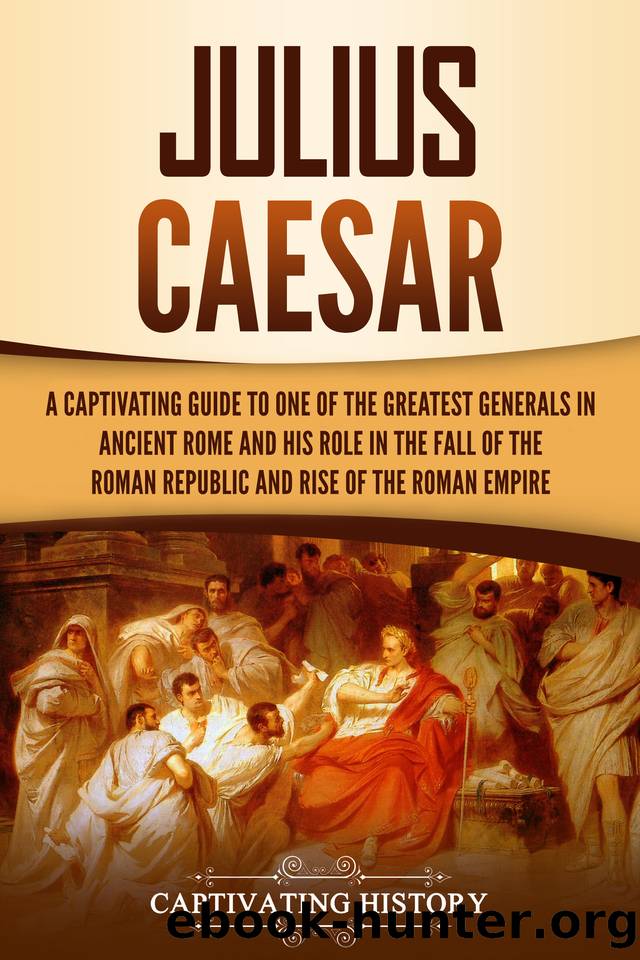Julius Caesar: A Captivating Guide to One of the Greatest Generals in Ancient Rome and His Role in the Fall of the Roman Republic and Rise of the Roman Empire (The Ancient Romans) by History Captivating

Author:History, Captivating
Language: eng
Format: epub
Published: 2023-03-16T00:00:00+00:00
Chapter Six â Caesar Becomes Consul (64â60 BCE)
Around the same time he moved up the real estate ladder, Caesar became more involved in the political side of his career. While many of the moves he was making around the mid-60s BCE were subtle and went purposefully unnoticed, he did find a way to gather his forces to create the biggest stir when he felt the time was ripe. However, to make things complicated, there was another young man named Marcus Porcius Cato, who was five years younger than Caesar (though just as ambitious). He was elected quaestor in 64.
As you will recall, this was not an exceptionally glamorous position, and Caesar chose to spend his time in this office in Hispania, rallying the common men to his side. Cato took a more standard route, being assigned to the treasury in Rome. While this could have been left as a kind of âwatch and learnâ experience, Cato saw an opportunity and ran with it. Rather than simply seeing how things were done, Cato paid attention to how they were supposed to be done but were not.
The blind eye that had been turned to provincial governors, tax collectors, and other slick politicians was no more once Cato was in charge. Had he chosen to simply attack a handful of senators or noblemen, it might have been easy to quash the young upstart. But Cato was relentless, going as far as to painstakingly review records back through the time of Sulla to discover where the money had disappeared and, more importantly, where it reappeared.
Perhaps this was one time that Caesarâs massive debt came to his aid. Accusations of bribery came against the man, but nothing was able to stick. Anyone looking over the books would have no problem seeing that, regardless of what he had been accused of in the past, ill-gotten gains were not one of Caesarâs flaws. So, while Cato tore through the treasury, Caesar took the time to stay out of the spotlight and plan his next moves.
In 63, Caesar was elected pontifex maximus, or the chief priest of the state religion. An important thing to note here is that, in contrast to Caesarâs original post as the priest of Jupiter, this religious role did not have many restrictions. With this position, Caesar acquired more power politically under the guise of more spiritual ambitions.
As chief priest, he was now in charge of the Vestal Virgins, who had come to his defense before. He led the pontiffs and gained the power to publish decrees and statements about religious life that were basically treated as law. This would be somewhat similar to the pope today in some aspects, except that his word carried the same weight as non-religious decrees and was treated as such. The major change for Caesar would have been yet another move, this time to the Domus Republica, which was the official residence of the high priest. He also gained an office in the Forum at the Regia, which
Download
This site does not store any files on its server. We only index and link to content provided by other sites. Please contact the content providers to delete copyright contents if any and email us, we'll remove relevant links or contents immediately.
The Daily Stoic by Holiday Ryan & Hanselman Stephen(3304)
The Fate of Rome: Climate, Disease, and the End of an Empire (The Princeton History of the Ancient World) by Kyle Harper(3060)
People of the Earth: An Introduction to World Prehistory by Dr. Brian Fagan & Nadia Durrani(2733)
Ancient Worlds by Michael Scott(2682)
Babylon's Ark by Lawrence Anthony(2673)
The Daily Stoic by Ryan Holiday & Stephen Hanselman(2572)
Foreign Devils on the Silk Road: The Search for the Lost Treasures of Central Asia by Peter Hopkirk(2463)
India's Ancient Past by R.S. Sharma(2451)
MOSES THE EGYPTIAN by Jan Assmann(2412)
The Complete Dead Sea Scrolls in English (7th Edition) (Penguin Classics) by Geza Vermes(2277)
The Earth Chronicles Handbook by Zecharia Sitchin(2227)
Lost Technologies of Ancient Egypt by Christopher Dunn(2224)
24 Hours in Ancient Rome by Philip Matyszak(2078)
Alexander the Great by Philip Freeman(2065)
Aztec by Gary Jennings(2023)
The Nine Waves of Creation by Carl Johan Calleman(1916)
Curse Tablets and Binding Spells from the Ancient World by Gager John G.;(1860)
Before Atlantis by Frank Joseph(1849)
Earthmare: The Lost Book of Wars by Cergat(1825)
